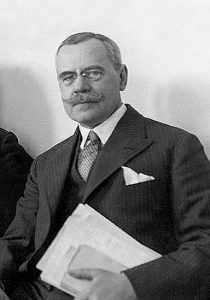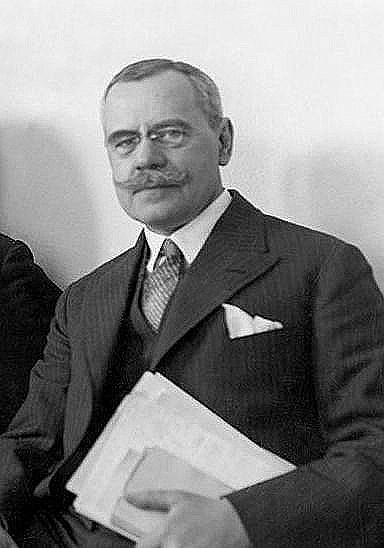
Bohdan Winiarski (1884 – 1969), an international lawyer, professor at the University of Poznań, judge and president of the International Court of Justice – was born on April 27, 1884, in Bohdanów in the Łomża Governorate. After graduating from high school in 1903, he began law studies at the University of Warsaw, which he continued at the Jagiellonian University. There, in 1910, he obtained his PhD in legal sciences. In the three years following the completion of his PhD dissertation, Winiarski developed his legal interests in Paris and Heidelberg. After returning to Kraków, he was associated with the Polish School of Political Sciences and then, after being drafted into the tsarist army, he devoted himself to lectures for students of the Higher Polish Courses in Petrograd. In 1920, he started working at the University of Poznań, where after habilitation – awarded at the Jagiellonian University in 1922 – he became the first professor and head of the Department of International Law, and then in 1936 the Dean of the Faculty of Law and Economics. He ended his formal cooperation with Poznań university after his election as judge at the International Court of Justice. He held this office from 1946 to 1967, going down in the history of international judiciary as the first Pole to be elected as ICJ President, a position he held from 1961 to 1964.
The main subject of Professor Winiarski’s research interests was public international law, primarily focused on the regulation of international rivers, peaceful means of dispute settlement, and the right to self-defence. To the theory and practice of international waterways Winiarski devoted two monographs – Polish rivers from the position of international law from 1922 and Principes généraux du droit fluvial international from 1934. To the peaceful means of dispute settlement Winiarski devoted his monograph Security, Arbitration, Disarmament on the role of arbitration in ensuring international security, in which he associates the notion of international peace with a mutual and collective guarantee of territorial ownership and independence based on the Roman beneficium possesionis, granting direct protection to the state as the possessor. The need to establish an external guarantee to ensure international peace comes from the analysis of the policies of states that strive to ensure security by maintaining an advantage in international relations. Against the background of such conduct, the balance of power is subjected to constant disturbances. These, in turn, lead to war, which determines the geopolitical position of States. In his critical study, Winiarski saw an opportunity to apply the idea of eternal peace to the external mechanisms of property protection, while noticing the fragility of the guarantees adopted in the Covenant of the League of Nations. Bearing in mind the distinction between the normative order and the factual dimension of international policy, which gives rise to inequality, Winiarski formulated conclusions regarding the activities of states that undermine this pacifist idea. The topic of international security, initiated by the study Security, Arbitration, Disarmament, was developed by Winiarski in his work Self-defense in the Law of Nations, in which he justified self-defence in the context of the notion of a just war. This proposal drew its source from the analysis of literature devoted to this subject. On this basis, he formed a broad approach to self-defence, the scope of which also included preventive war. Winiarski suggested that a just war can serve not only to repel aggression but also to prevent it. The interpretation of this view, which was far from the position prevailing in the contemporary doctrine, requires the adoption of a synchronic perspective, which makes it possible to read his words through the prism of the realities prevailing in the interwar period, related to the development of the military power of the Third Reich and the geopolitical location of the new Polish state.
Professor Winiarski's scientific achievements are not limited to international law; they also extend to the theory of state and law, as well as constitutional law, which is reflected in: Electoral reform and representation in France from 1913, Political System of the Polish Lands in the 19th century from 1923 and Realism in the theory of law from 1925. In Electoral reform and representation in France on the French parliamentary system, Winiarski addressed critical remarks to the French parliamentary system, while searching for a model of a political regime for the future Polish state. In Political System of the Polish Lands in the 19th century he then developed this approach to the Polish lands under Partition. In Realism in the theory of law from 1925 he wrote about the model of the science of law, criticizing legal language, which diverges from the "realistic tendency" towards philosophical speculations.
Apart from scientific work, political activity occupies a special place in Professor Winiarski's biography. Winiarski resigned from political activity after being elected judge at the International Court of Justice. Until then, he actively participated in the political life of the Polish liberation movement in the years 1910 - 1918, the reborn Poland of the interwar period, and the emigration structures of the occupied state. The beginnings of this activity date back to his junior high school period, when he joined the organizations "Future" and "Red Rose". Driven by pro-independence slogans, he continued this activity, as a board member of the Polish Youth Union "Zet" and the author of texts devoted to the idea of recreating the Polish state, and then as secretary of the Legal Section of the Polish National Committee in Paris, alongside Roman Dmowski. This activity led Winiarski to the sessions of the Paris Congress, which took place in April 1919. As a member of the Polish delegation, he represented the raison d'état of the reborn state structures, conducting diplomatic actions in the interests of the Second Polish Republic.
In the interwar period, Winiarski also held parliamentary functions, while participating in the creation of the National Party – a nationalist party, with frequent antisemitic tendencies, although it is uncertain if Winiarski himself supported such stances. His parliamentary activity was marked by critical reflection on foreign policy in his parliamentary speeches. In these statements, he devoted attention to the Versailles order, taking into account in particular Polish-German relations. The target of critical reflection in Winiarski's speeches was also the May Coup and the authoritarian policy of Sanation, which he saw as undermining the foundations of the democratic system. The progressive radicalization of the young national movement also led him to revise his assessment of the changing policy of the National Democracy movement, which, as World War II was about to break out, he compared to the foreign political nature of the Sanation policy.
After the outbreak of World War II, Professor Winiarski was arrested in the Golden Hall of the Poznań City Hall, where he remained until November 8, 1939. Then, together with his wife, daughter and son, he was moved to the camp on Główna, from where they were resettled to the East. The family finally found shelter in the estate of the father-in-law of the Winiarskis' eldest daughter. From there, together with his son, he traveled, and finally arrived to London. At this point, another page opened in his biography - the page of the émigré politician. During this period, he was the chairman of the Commission appointed on May 30, 1940 to determine the causes of the defeat suffered by Poland in the war of 1939, a negotiator during the Polish-Czechoslovak talks on the confederation, an expert in the governments of Władysław Sikorski and Stanisław Mikołajczyk, advising on international law, the President of the Bank of Poland, a member of the international commissions responsible for the post-war world order, and lecturer at the Polish Faculty of Law at the University of Oxford.
The election to the position of a judge of the International Court of Justice was the crowning event in Professor Winiarski's life path. Bearing in mind his former activity in the interwar and emigration period, and being aware that it was no longer possible to recreate an independent State of Poland in the post-war order reality, Winiarski agreed to his candidacy being presented to the United Nations by the Polish government in Warsaw. On February 6, 1946, the General Assembly and the Security Council elected him to this function. Winiarski held his position as a judge of the International Court of Justice until July1967. During this period, he participated in the work of the Hague Court, examining twenty-one cases and issuing advisory opinions. He inaugurated his activity in the international judicial system of the United Nations with a ruling on the dispute between Great Britain and Albania over the Strait of Corfu concerning state responsibility for damages at the sea. His last verdict as a judge was passed on July 18, 1966, in the case of the status of South West Africa that has been considered as one of the most controversial judgments in the history of the ICJ because of legal formalist approach - and its implicit endorsement of colonial international law - preferred by the majority of judges over judgment on the South Africa’s occupation of Namibia and its Apartheid policy. Serving as a judge and president of the Hague Court, Winiarski remained professor of international law, active in the field of legal sciences, teaching and translating in the Hague Academy of International Law, the Institute of International Law in Ghent, and the University of Poznań.
Professor Winiarski died on December 4, 1969, a few weeks after his wife Wanda, with whom he had lived together for fifty-six years, raising a son and two daughters.
Paweł Kwiatkowski (University of Gdańsk)
Bibliography
-
Rzeki polskie ze stanowiska prawa międzynarodowego, Poznań 1922.
-
Bezpieczeństwo, arbitraż, rozbrojenie, Poznań 1928.
-
Obrona konieczna w prawie narodów, Lwów 1936.
-
Principes généraux du droit fluvial international “Recueil des Cours de l'Académie de Droit International” 1933.


